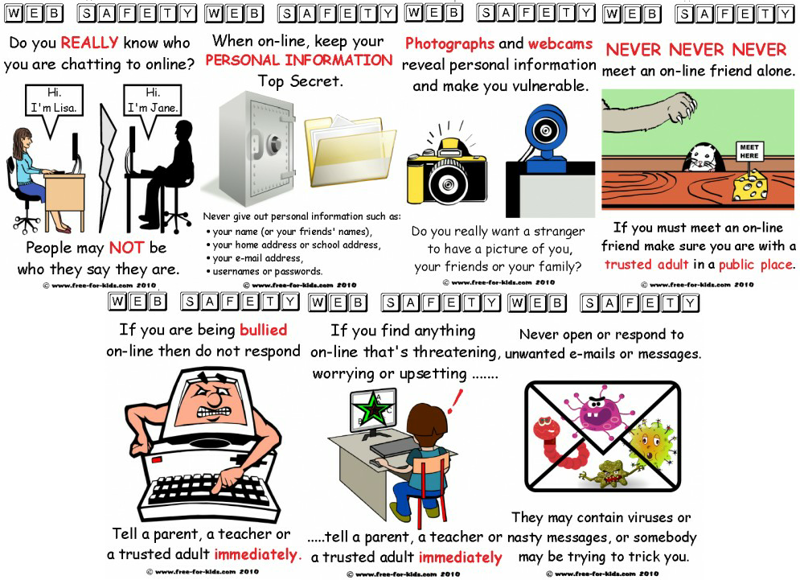- Home
- Parents
- Internet Safety
Internet Safety
Keeping our pupils safe online is extremely important to us.
If you can use this website then you should read this important section of our website.
Online Safety Tips for Children
Online Safety Tips for Children with New Devices

Social Networking
- Never put your full address on your site. It’s best to leave the space blank, or if you do want to add some information, make sure that you make your profile private so only your friends can see it.
- It’s a good idea to use a nickname rather than your real name - your friends will know your nickname so will know it’s you!
- It’s a good idea to put your real age on your site - if you lie and say you are older, you may get adults trying to contact you.
- It’s also not a good idea to put your mobile number on your site - your real friends will already have it!
- Use your Privacy Settings! Adjust your account settings (sometimes called “Privacy Settings”) so only approved friends can instant message you. This won’t ruin your social life – new people can still send you friend requests and message you, they just won’t be able to pester you via IM. This means that people you don’t want to see your profile can’t!
Chat Rooms & Online Forums
- If you see a message that upsets you, tell a trusted adult.
- When you log onto a forum or chat room, always use a nickname rather than give your real name. Nicknames can be a fun way to hide your identity when chatting online, but it’s not a good idea to pretend to be someone your not.
- Some people who use chat rooms or forums lie about who they are. When you’re leaving messages to people in forums, never give out any personal information about yourself. This includes your full name, address or school. It’s ok to tell someone what city you live in, as long as you don’t include anything else. Even giving a school name can be enough to allow someone to find you. If anyone ever asks you for this information, tell a trusted adult straight away.
- Some people who you meet online may not be who they say they are. It’s very easy for people to lie when they’re chatting online, so never arrange to meet up with someone who you have met online. If anyone asks to meet up with you, tell a trusted adult. It is not a good idea, but if you do decide to meet up then make sure you take a trusted adult with you and meet in a public place.
Chatting
- When you’re chatting to people online, try not to give out any personal information about yourself. This includes your full name, address or school. It’s ok to tell someone what city you live in though as long as you don’t include anything else. Even giving a street name can be enough to allow someone to find you. If anyone ever asks you for this information, tell a trusted adult straight away.
- Some people who you meet online may not be who they say they are. It’s easy for people to lie when they’re chatting over the internet, so don’t arrange to meet up with someone who you have met online. If anyone asks to meet up with you, tell a trusted adult. It is not a good idea, but if you do decide to meet up then make sure you take a trusted adult with you and meet in a public place.
Instant Messaging
- If someone adds you to their contact list and you don’t know them, make sure you block them. This will stop them from seeing when you are logged on, and they won’t be able to contact you. If you add someone and decide afterwards you don’t want them on your list you can delete them too.
- If you have your own profile on IM, it’s not a good idea to include lots of information about yourself, like your hobbies, favourite band, your address and school.
- It’s also not a good idea to have a picture of yourself on your profile - you can use one of the pictures that are on IM already, or a picture of a pet or your favourite pop group. This is because if you have someone on your contact list who you don’t know in the real world, they will be able to have access to your profile and see what you look like.
- Webcam images can be recorded and copied and also shared with other people, so the best thing to do is not use a webcam with people you don’t know in the real world.
- It’s important to remember that if you receive an email from someone you don’t know, never open it. Tell an adult you trust if you’re not sure what to do.
- Make sure you always delete emails from people you don’t know.
- Never give out personal information, like your full name, address or school to people you talk to using email, if you don’t know them in the real world. If anyone you talk to online asks for this information, tell a trusted adult.
- Some people use emails to send pictures of themselves to friends and family, but it’s not a good idea to send a picture to someone you have met online who you don’t know in the real world. They may not be who they say they are, and you don’t want a stranger to have a picture of you or your friends/ family.
- Treat people how you would like to be treated yourself. Take responsibility for what you write when using email and never write something that might hurt or upset someone.
For further reading and information, go to https://www.thinkuknow.co.uk/.



